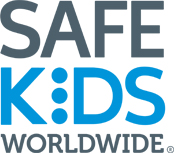Concussions: The Importance of Using Our Heads

When I’m not working at Safe Kids, I spend most of my time coaching a club field hockey team with girls ages 12-19. This is an elite club that was created for the best players from northern Virginia to come together, play in tournaments and hopefully get recruited to play in college. They are incredible athletes and have an inspiring passion for the game.
One Sunday I was coaching at an indoor tournament in Maryland when one of our players, Leah, was tripped from behind. Indoor field hockey is played on a hard wood floor or a synthetic material that has the same hard feel as a basketball court. It’s not something you want to smash your head on, which is exactly what happened to Leah.
Leah burst into tears. I rushed onto the court and ushered her off. Then I ran to get the athletic trainer who was scheduled to work our game and led him to our bench to evaluate Leah.
- Does your head hurt? (yes)
- Are you nauseous? (no)
- Are you dizzy? (no)
He looked in Leah’s eyes, asked her to perform a few minor movements and they talked briefly. Leah is a tough, competitive and a strong leader on the team. Naturally, she was anxious to get back in. So he let her. In his defense, Leah seemed relatively fine but I still had doubts.
Four days later, Leah told us that she went to the doctor. She had a concussion and would have to miss the National Indoor Tournament, a championship tournament that she had trained for all season. She was so disappointed and I felt so guilty that I let Leah return to play that day. Even though the trainer was technically the so-called expert, I should have trusted my instincts. When in doubt, sit them out, right? I still think about what could have happened if she had been knocked down again. The repercussions could have been long term – much worse than just missing one tournament.
Here at Safe Kids we believe empowering coaches with information about injuries is an important way to keep kids safe. We actually have a whole set of resources just for coaches.
The Centers for Disease and Control and their Heads Up Campaign has an online training program as well to teach coaches how to identify potential concussions and what to do if an athlete sustains one. After taking this training I feel much more confident in my ability to keep my athletes safe, and I know exactly what to do if one of them hits her head.
We know that parents trust coaches to take care of their children. This is an important job and we, as coaches, need to understand that we’re not alone. There are resources to help so we can make sure our kids can stay active, healthy and safe.
This blog was written by Julie Kenneally.
